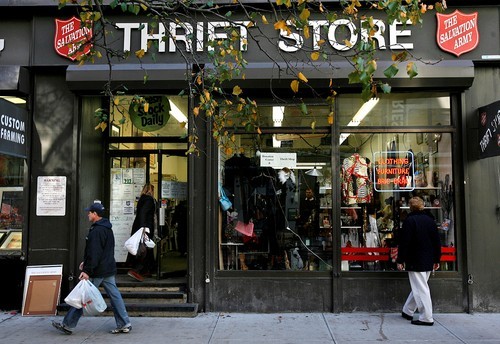In
my film class, we recently completed a long-term project in which we
made a documentary focusing on a topic of our choice. As the whole
process came to a close, I wanted to write a small reflection on what
I've been working so hard on for the past couple of months.
For
the assignment, my group of five created a documentary exploring the
changing attitudes towards thrift stores over the past few years.
Through interviews and research we also tried to determine the
reasons why thrift stores have suddenly become so trendy, especially
among teenagers. Initially, we had though of doing a project on
either on the evolution of candy stores or the meaning of dreams, but
we realized thrift stores were more relevant and new. I think this
was a really good choice. Even now, after our documentary is done,
I'm still interested in the topic, and would actually be interested
in finding out more about some thrift stores my interviewees
mentioned. I'm also really pleased with the freedom we had in
choosing the topics. Although I haven't seen many of my peers'
documentaries yet I think the fact that we had so much say in
choosing our topics will result in a much more varied and interesting
bunch of films.
While
making our documentary, the biggest challenge my group faced was
getting all of our footage imported into the computer. At first we
had difficulties getting the footage onto the computer because we had
forgotten to put the camera into mp4 mode before we began recording.
Unfortunately, we had already spent two class periods repeatedly
trying to import footage before we came to this realization. Once we
figured that out, we had to put all of the footage onto the teacher's
laptop and use some movie software to convert all the video. Even
after that though, the computer refused to recognize the footage so
we had to switch computers. After that everything seemed to work fine
until we began trying to edit the interviews which refused to render.
Finally, we re-imported the interviews and everything turned out
fine.
When
we started the film, I already thought I knew everything about
thrifting because it seemed pretty self explanatory. Throughout the
process, however, I did learn a couple more interesting things on the
subject. For example, I learned that thrifting can be a career, and a
very successful one at that. Two of our interviewees, Phoebe Verkouv
and Brandhyze Stanley, are both avid bloggers about thrift stores and
have gained quite a bit of fame from it. Through making this project
I also learned that there is a pretty cool man called Macklemore who
has a song about thrift stores. Finally, I learned that there are way
more thrift stores in this area than I thought. In many of the
interviews, people named at least five stores I'd never heard of.
If
I had the chance to create another documentary I would let someone
else handle the camera. When we went out to get B-Roll of Value
Village and Unique Thrift, we spent around four hours running around
trying to get nice shots. These four hours ended up being a complete
waste of time because throughout the entire process I'd been hitting
record when I should have been hitting stop and vice-versa. We had
to go backto the thrift store because the only footage we had was of
the floor and people's feet. If I could do another documentary I
would also try to get a more varied group of interviewees. When I
started editing the film, I realized that all of our interviews were
of people within the CAP program. I think that this made for more
biased film than we would've wished for.
This
was generally a really great project which gave us an opportunity to
learn both about a topic of interest and documentary film making.
However, there are a few things that would have made the process
smoother and more manageable. First of all, I definitely think that
we needed more time. The snow days, British kids' visit, and other
complications often interfered with our projects and took away time
that we really needed. I also think there should have been more
training prior to beginning the project. Many students had forgotten
how to edit either partially or completely since the film class we
took last year. For this reason, they were unable to help with
editing because there wasn't enough time to learn how to work with
Final Cut Pro. Giving the class some quick lessons on the basics of
the program would probably increase the quality of the films and
decrease the amount of stress put on the teachers and each of the
group members. Besides these couple of things, the project was very
enjoyable and educational.



